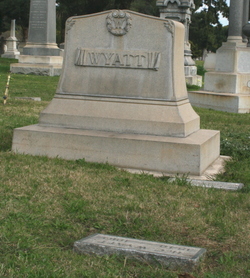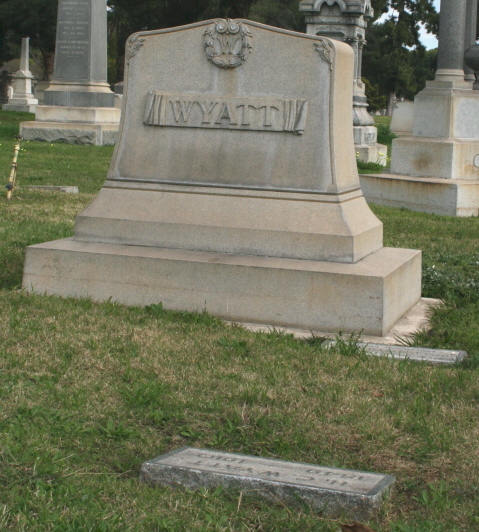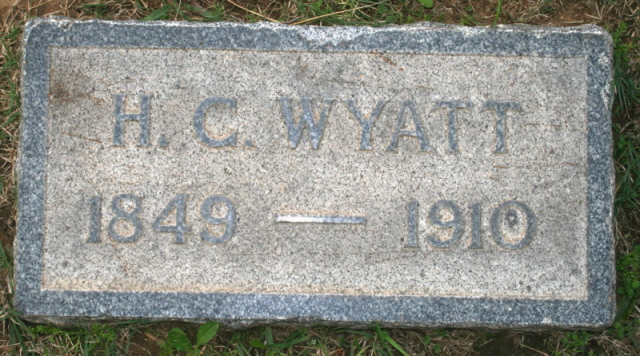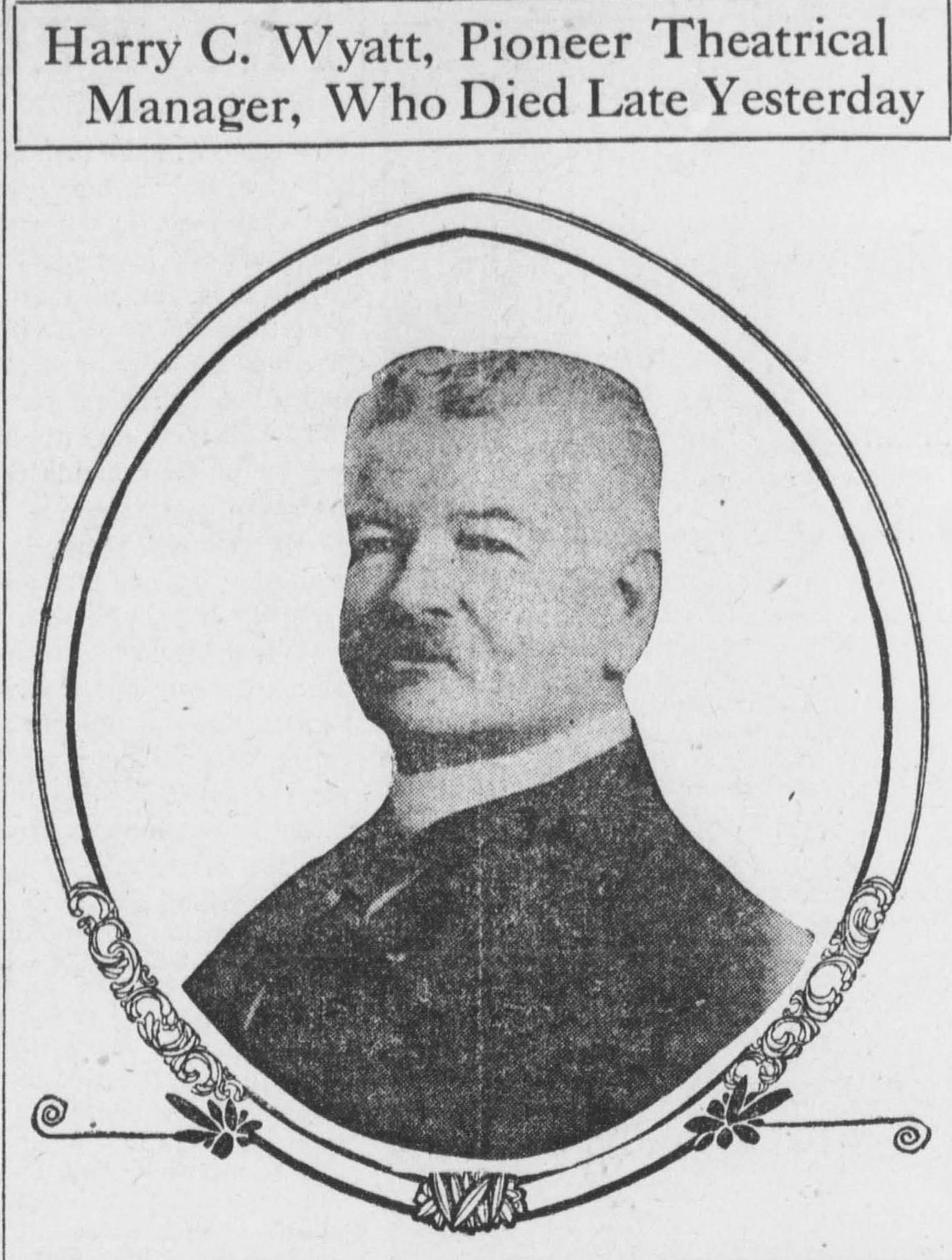Tuesday Morning
July 26, 1910
page 10
LIFE'S STAGE LOSES WYATT.
Veteran Manager Dead After a Short Illness.
Drama's Pioneer Won Fortune by Sticking to It.
Syndicate Assures Son He Will Succeed Father.
H. C. Wyatt, dean of the theatrical managers of the Southwest and one of the leading resident managers affiliated with the syndicate in this country, died at his home, No. 600 South Burlington avenue [sic], this city, yesterday morning at 6 o'clock.
Mr. Wyatt was the theatrical pioneer of Los Angeles, in a large way, and had been at the front of local amusement life for twenty-five years.
He was 61 years of age, and his quarter-century of business here had witnessed his passage from the state of a town-hall impresario to the affluent manager of a great theater, playing the leading attractions of the world.
He was a Virginian, having been born in Richmond, and at 13 years of age, ran away to join the Confederate army as a drummer boy. As a drummer boy he served, and when Pickett's brigade, "the flower of the Confederacy," swept into its sunny valley of death at Gettysburg, young Harry Wyatt was with it, drumming away for dear life. But when they carried him off the field his left arm was missing.
Mr. Wyatt leaves a son, W. T. Wyatt, who will succeed him in business, and a daughter, Mrs. E. Salmon of Richmond, Va. A daughter, Helen [?], preceded him in death but a few months.
Mr. Wyatt's original matrimonial adventure terminated in a recent separation, and his widow is at present living in the East. According to the reports of intimate friends, he was to have married Miss Elsie Crossley, his former stenographer, in September.
The funeral services will be conducted from his late residence tomorrow afternoon at 2 o'clock, and the interment will be at Rosedale. Rev. Baker F. Lee will be the officiating clergyman, and the list of pallbearers, which was not quite complete last night, has been chosen from his lifelong personal friends. Four of these will be Louis Vetter, J. M. Dodge of San Diego, Leland Bagley, and H. Alden. The honorary pallbearers will include the leading theatrical folk of the city and many professional and business men.
Funeral arrangements are to a certain degree in the hands of the Elks of which H. C. Wyatt was a prominent member, and in a way in the province of the Manager's Association, of which body he was president.
The late Mr. Wyatt was ill but little more than a week, having been seized at his beach home by an attack of giddiness, followed by temporary lapses of memory. He was brought to this city and at the advise of his physician, Dr. William Munroe Lewis, was put to bed immediately. He sank almost at once into a state of coma, from which he rallied a little at intervals. Though never confined to his bed in his life, he had been combatting an attack of diabetes for eighteen months. This, coupled with or more likely instigating a general nervous breakdown, caused death in a speedy and comparatively painless form.
Telegrams were received yesterday from all points of the compass, but the one of greatest public interest is that to W. T. Wyatt from Mssrs. Klaw & Erianger under whose franchise Wyatt senior had so successfully operated the Mason Opera house.
This wire says: "Please accept and extend to your family our sincerest sorrow for your loss of a dear father and ours of a good friend. You may depend we will be as loyal to you as we were to him."
Which indicates that as far as they are concerned, son will succeed father in the management of the Broadway theater. And in fact, young Mr. Wyatt last night announced his intention of taking up his father's business at the point at which he left off, and continuing as before.
The bookings for next season at the Mason are practically completed, and the lease of the theater, but recently renewed by the deceased manager, has thirteen more years to run.
By a strange coincidence Mr. Wyatt had just completed his managerial year when overtaken by his last illness. Margaret Anglin closed his season for him, and, shutting up his offices, he went to his beach home, at Playa del Rey and prepared to quietly enjoy himself until the middle of next month, when his theater is to reopen.
"The Governor," as he was familiarly known to his intimates, first saw Los Angles in 1882. He came here with a minstrel show, for in those days he was a minstrel of repute, and as a tenor balladist and second tenor of the famous old California quartette, he won state-wide renown. Later on he paid another visit to the city, and liked the town so well that he bade his associates travel on without him, while he remained to try his fortunes in a town which was promising, indeed, but which was then no more a theatrical metropolis than a rural county-seat.
Then began his period of stress and storm – a period which lasted, in fact, for many years. At some seasons of the year he did his own bill-posting, trundling the materials from fence to fence in a wheelbarrow. At all times he was desperately put to it for attractions and only by shrewd manipulation and cleverness did he succeed in keeping up even the semblance of a regular line of shows.
After a time he became the manager of Childs's, now the Grand Operahouse. This was the first theater of size.
Next came the well-known old Los Angeles, on the site of the present Orpheum.
About this time the theatrical syndicate was perfected, and the man who never knew from which point of the compass his next attraction would come, hailed with joy the prospect of a well-regulated and assured line of bookings.
Some money which Mr. Wyatt had accumulated at this time he invested in real estate – at boom prices. With the pricking of the bubble his little savings were swept away. The huge Orpheura circuit, besides, began to bargain for the very house under his feet. It was with no small amount of patience and grit, therefore, that the now middle-aged manager, with but little means and with a great vaudeville trust after his place of business, began to quietly, patiently and tirelessly scheme for the dream of his life – a handsome Broadway theater.
How he realized this theater, recognized as one of the handsomest and [?] commodious playhouses of this United States, is a matter of current history.
With Mr. Wyatt's accession to the Mason Operahouse, Los Angeles became, a genuine city. The syndicate began to send the great actors and the great productions here for extended engagements. Mr. Wyatt began to make money and he has made it rapidly ever since.
His profits during the past four years alone have been in excess of $150,000.
Mr. Wyatt left a will, which will probably be read on Thursday.
Tuesday Morning
July 26, 1910
page 10
LIFE'S STAGE LOSES WYATT.
Veteran Manager Dead After a Short Illness.
Drama's Pioneer Won Fortune by Sticking to It.
Syndicate Assures Son He Will Succeed Father.
H. C. Wyatt, dean of the theatrical managers of the Southwest and one of the leading resident managers affiliated with the syndicate in this country, died at his home, No. 600 South Burlington avenue [sic], this city, yesterday morning at 6 o'clock.
Mr. Wyatt was the theatrical pioneer of Los Angeles, in a large way, and had been at the front of local amusement life for twenty-five years.
He was 61 years of age, and his quarter-century of business here had witnessed his passage from the state of a town-hall impresario to the affluent manager of a great theater, playing the leading attractions of the world.
He was a Virginian, having been born in Richmond, and at 13 years of age, ran away to join the Confederate army as a drummer boy. As a drummer boy he served, and when Pickett's brigade, "the flower of the Confederacy," swept into its sunny valley of death at Gettysburg, young Harry Wyatt was with it, drumming away for dear life. But when they carried him off the field his left arm was missing.
Mr. Wyatt leaves a son, W. T. Wyatt, who will succeed him in business, and a daughter, Mrs. E. Salmon of Richmond, Va. A daughter, Helen [?], preceded him in death but a few months.
Mr. Wyatt's original matrimonial adventure terminated in a recent separation, and his widow is at present living in the East. According to the reports of intimate friends, he was to have married Miss Elsie Crossley, his former stenographer, in September.
The funeral services will be conducted from his late residence tomorrow afternoon at 2 o'clock, and the interment will be at Rosedale. Rev. Baker F. Lee will be the officiating clergyman, and the list of pallbearers, which was not quite complete last night, has been chosen from his lifelong personal friends. Four of these will be Louis Vetter, J. M. Dodge of San Diego, Leland Bagley, and H. Alden. The honorary pallbearers will include the leading theatrical folk of the city and many professional and business men.
Funeral arrangements are to a certain degree in the hands of the Elks of which H. C. Wyatt was a prominent member, and in a way in the province of the Manager's Association, of which body he was president.
The late Mr. Wyatt was ill but little more than a week, having been seized at his beach home by an attack of giddiness, followed by temporary lapses of memory. He was brought to this city and at the advise of his physician, Dr. William Munroe Lewis, was put to bed immediately. He sank almost at once into a state of coma, from which he rallied a little at intervals. Though never confined to his bed in his life, he had been combatting an attack of diabetes for eighteen months. This, coupled with or more likely instigating a general nervous breakdown, caused death in a speedy and comparatively painless form.
Telegrams were received yesterday from all points of the compass, but the one of greatest public interest is that to W. T. Wyatt from Mssrs. Klaw & Erianger under whose franchise Wyatt senior had so successfully operated the Mason Opera house.
This wire says: "Please accept and extend to your family our sincerest sorrow for your loss of a dear father and ours of a good friend. You may depend we will be as loyal to you as we were to him."
Which indicates that as far as they are concerned, son will succeed father in the management of the Broadway theater. And in fact, young Mr. Wyatt last night announced his intention of taking up his father's business at the point at which he left off, and continuing as before.
The bookings for next season at the Mason are practically completed, and the lease of the theater, but recently renewed by the deceased manager, has thirteen more years to run.
By a strange coincidence Mr. Wyatt had just completed his managerial year when overtaken by his last illness. Margaret Anglin closed his season for him, and, shutting up his offices, he went to his beach home, at Playa del Rey and prepared to quietly enjoy himself until the middle of next month, when his theater is to reopen.
"The Governor," as he was familiarly known to his intimates, first saw Los Angles in 1882. He came here with a minstrel show, for in those days he was a minstrel of repute, and as a tenor balladist and second tenor of the famous old California quartette, he won state-wide renown. Later on he paid another visit to the city, and liked the town so well that he bade his associates travel on without him, while he remained to try his fortunes in a town which was promising, indeed, but which was then no more a theatrical metropolis than a rural county-seat.
Then began his period of stress and storm – a period which lasted, in fact, for many years. At some seasons of the year he did his own bill-posting, trundling the materials from fence to fence in a wheelbarrow. At all times he was desperately put to it for attractions and only by shrewd manipulation and cleverness did he succeed in keeping up even the semblance of a regular line of shows.
After a time he became the manager of Childs's, now the Grand Operahouse. This was the first theater of size.
Next came the well-known old Los Angeles, on the site of the present Orpheum.
About this time the theatrical syndicate was perfected, and the man who never knew from which point of the compass his next attraction would come, hailed with joy the prospect of a well-regulated and assured line of bookings.
Some money which Mr. Wyatt had accumulated at this time he invested in real estate – at boom prices. With the pricking of the bubble his little savings were swept away. The huge Orpheura circuit, besides, began to bargain for the very house under his feet. It was with no small amount of patience and grit, therefore, that the now middle-aged manager, with but little means and with a great vaudeville trust after his place of business, began to quietly, patiently and tirelessly scheme for the dream of his life – a handsome Broadway theater.
How he realized this theater, recognized as one of the handsomest and [?] commodious playhouses of this United States, is a matter of current history.
With Mr. Wyatt's accession to the Mason Operahouse, Los Angeles became, a genuine city. The syndicate began to send the great actors and the great productions here for extended engagements. Mr. Wyatt began to make money and he has made it rapidly ever since.
His profits during the past four years alone have been in excess of $150,000.
Mr. Wyatt left a will, which will probably be read on Thursday.
Gravesite Details
Interment on July 27, 1910.
Family Members
Sponsored by Ancestry
Advertisement
Advertisement











